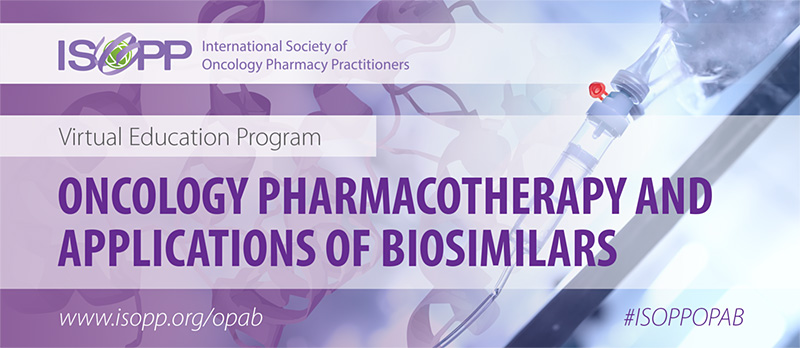
ISOPP's Oncology Pharmacotherapy and Applications of Biosimilars program will consist of 10 online courses (total of 25 hours) and an opportunity to meet at ISOPP’s 2022 Symposium in Spain to expand the Biosimilars Expert Network.
Click on the module topic below to navigate this page by module. Click on the Author to view their biography.
- Fundamentals of Biosimilars use in contemporary oncology clinical practice
- Fundamentals in oncology pharmacy practice
- Management of breast cancer
- Management of colorectal cancer
- Management of lung cancer
- Management of gynecological cancer
- Management of upper GI cancers
- Management of kidney cancer
- Cancer supportive care management
- Implementation of Biosimilars in clinical practice
Module 1 - Fundamentals of Biosimilars use in contemporary oncology clinical practice
Duration: 2 hours
Author/Presenter/Facilitator: Joseph Bubalo, Oncology Pharmacotherapy Specialist, OHSU Hospital and Clinics, USA
Learning Objectives:
- Define the term “Biosimilars” and understand the rationale for Biosimilars use.
- Describe the similarities and differences between Biosimilars and reference biologics in terms of structure, function and regulatory requirements.
- Discuss clinical issues involving the use of Biosimilars, including extrapolation of indication and interchangeability/switching.
- Evaluate clinical data comparing Biosimilars and reference biologics.
Module 2 - Fundamentals in oncology pharmacy practice
Duration: 2 hours
Author/Presenter/Facilitator: Tegan Bilse, Oncology Pharmacist, Soweto Comprehensive Care Centre – Chris Hani Baragwanath Academic Hospital, South Africa
Co-Author/Facilitator: Aygin Bayraktar-Ekincioglu, Ph.D, Associate Professor, Department of Clinical Pharmacy - Hacettepe University, Ankara, Turkey
- Define the scope of practice of oncology pharmacists and the roles that pharmacists play in a multidisciplinary cancer care team.
- Discuss the various types of clinical services and programs that are commonly implemented by oncology pharmacists around the world.
- Discuss the metrics and outcomes that are commonly utilized to measure the success of clinical services and programs implemented by oncology pharmacists.
Module 3 - Management of breast cancer
Duration: 3 hours
Author/Presenter/Facilitator: Kellie Jones Weddle, Clinical Professor of Pharmacy Practice, Purdue University College of Pharmacy, USA
Learning Objectives:
- Discuss the current pharmacotherapy approaches in the management of breast cancer, using evidence-based information.
- Apply pharmacotherapy knowledge of breast cancer on oncology patient care, through the provision of various oncology pharmacy services.
- Discuss efficacy, safety and humanistic outcomes data of selected Biosimilars used in breast cancer with respect to their originator product.
Module 4 - Management of colorectal cancer
Duration: 3 hours
Author/Presenter/Facilitator: Lisa M. Holle, Associate Clinical Professor, Department of Pharmacy Practice, UConn School of Pharmacy, USA
Learning Objectives:
- Discuss the current pharmacotherapy approaches in the management of colorectal cancer, using evidence-based information.
- Apply pharmacotherapy knowledge of colorectal cancer on oncology patient care, through the provision of various oncology pharmacy services.
- Discuss efficacy, safety and humanistic outcomes data of selected Biosimilars used in colorectal cancer with respect to their originator product.
Module 5 - Management of lung cancer
Duration: 3 hours
Author/Presenter/Facilitator: Islam Elkonaissi, Lead Lung Cancer & Clinical Commissioning Support Pharmacist, The Royal Marsden NHS Foundation Trust & BOPA, UK
Learning Objectives:
- Discuss the current pharmacotherapy approaches in the management of lung cancer, using evidence-based information.
- Apply pharmacotherapy knowledge of lung cancer on oncology patient care, through the provision of various oncology pharmacy services.
- Discuss efficacy, safety and humanistic outcomes data of selected Biosimilars used in lung cancer with respect to their originator product.
Module 6 - Management of gynecological cancer
Duration: 3 hours
Author/Presenter/Facilitator: Judith A. Smith, Associate Professor, UTHealth Medical School at Houston, USA
Learning Objectives:
- Discuss the current pharmacotherapy approaches in the management of gynecological cancer, using evidence-based information.
- Apply pharmacotherapy knowledge of gynecological cancer on oncology patient care, through the provision of various oncology pharmacy services.
- Discuss efficacy, safety and humanistic outcomes data of selected Biosimilars used in gynecological cancer with respect to their originator product.
Module 7 - Management of upper GI cancers
Duration: 2 hours
Author/Presenter/Facilitator: Lillian Cortez, GI Cancer Specialist Pharmacist, Department of Pharmacy, Royal Marsden NHS Foundation Trust, UK
Learning Objectives:
- Discuss the current pharmacotherapy approaches in the management of upper GI cancer, using evidence-based information.
- Apply pharmacotherapy knowledge of upper GI cancer on oncology patient care, through the provision of various oncology pharmacy services.
- Discuss efficacy, safety and humanistic outcomes data of selected Biosimilars used in upper GI cancer with respect to their originator product.
Module 8 - Management of kidney cancer
Duration: 2 hours
Author/Presenter/Facilitator: Emma Foreman, Consultant Pharmacist, The Royal Marsden NHS Foundation Trust, UK
Learning Objectives:
- Discuss the current pharmacotherapy approaches in the management of kidney cancer, using evidence-based information.
- Apply pharmacotherapy knowledge of kidney cancer on oncology patient care, through the provision of various oncology pharmacy services.
- Discuss efficacy, safety and humanistic outcomes data of selected Biosimilars used in kidney cancer with respect to their originator product.
Module 9 - Cancer supportive care management
Duration: 2 hours
Author/Presenter/Facilitator: Alexandre Chan, Professor of Clinical Pharmacy and Department Chair, Department of Clinical Pharmacy Practice, UC Irvine School of Pharmacy & Pharmaceutical Sciences, USA
Learning Objectives:
- Discuss the basic principles of supportive care in cancer management.
- Discuss the current management of chemotherapy-induced nausea and vomiting, myelosuppression, bone health and oncologic emergencies in accordance to therapy guidelines.
- Discuss patient perspectives and challenges in providing supportive care for cancer management.
- Discuss opportunities to utilize Biosimilars for optimizing cancer supportive care.
Module 10 - Implementation of Biosimilars in clinical practice
Duration: 3 hours
Author/Presenter/Facilitator: Emma Foreman, Consultant Pharmacist, The Royal Marsden NHS Foundation Trust, UK
Learning Objectives:
- Discuss logistic considerations that are important in the incorporation of Biosimilars into clinical practice.
- Demonstrate the ability to provide education on Biosimilar use to both patients and healthcare professionals (best practices).
- Identify strategies and resources that can facilitate the process of implementing Biosimilars in clinical practice.
